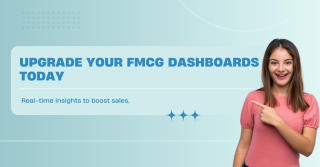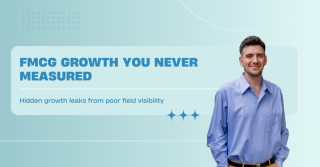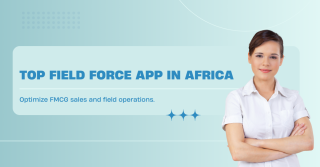FMCG Distribution Network: Trends Shaping The Future of Logistics

The fast-moving consumer goods (FMCG) industry is a fast-paced, ever-evolving sector where efficiency and adaptability are key. At the heart of this industry lies the FMCG distribution network, a complex system that ensures products move seamlessly from manufacturers to consumers. However, with changing consumer demands, technological advancements, and the push for sustainability, the future of FMCG logistics is undergoing a transformation.
In this blog, we’ll explore the latest trends shaping the future of FMCG distribution networks and how businesses can adapt to stay ahead.
What is the FMCG Distribution Network?
The FMCG distribution network is the backbone of the industry, connecting manufacturers, wholesalers, distributors, retailers, and consumers. It ensures that products are delivered quickly, efficiently, and in the right quantities. However, as consumer expectations rise and markets become more competitive, this network is evolving to meet new challenges.
Challenges in the FMCG Distribution Network
-
Complex Supply Chains:
Multiple intermediaries can lead to inefficiencies, delays, and increased costs. -
Rising Consumer Expectations:
Consumers demand faster delivery, personalized experiences, and sustainable practices. -
Logistical Bottlenecks:
Inefficient routes, poor inventory management, and lack of real-time visibility can disrupt operations. -
Regulatory Compliance:
Companies must adhere to strict regulations related to product safety, labeling, and environmental impact.
Trends Shaping the Future of FMCG Logistics
1. Digital Transformation: The Game-Changer
Digital tools are revolutionizing FMCG logistics. Platforms like Delta Sales App are enabling companies to automate processes, track shipments in real-time, and optimize routes. These tools provide end-to-end visibility, ensuring smoother operations and better decision-making.
2. E-Commerce Integration: The New Normal
The rise of online shopping has forced FMCG companies to integrate e-commerce into their distribution networks. This includes partnerships with e-commerce platforms, optimizing online product listings, and ensuring efficient order fulfillment.
3. Sustainability: A Priority, Not an Option
Consumers and regulators are demanding eco-friendly practices. Companies are adopting sustainable packaging, optimizing transportation routes to reduce carbon emissions, and working with suppliers who prioritize sustainability.
4. Advanced Analytics and AI: Driving Smarter Decisions
Artificial intelligence (AI) and advanced analytics are being used to forecast demand, manage inventory, and optimize transportation routes. These technologies provide real-time insights, enabling companies to make data-driven decisions.
5. Omni-Channel Distribution: Meeting Consumers Everywhere
Omni-channel distribution combines traditional retail channels, e-commerce platforms, and direct-to-consumer sales to maximize reach and sales. This approach ensures that products are available to consumers through their preferred channels.
6. Enhanced Supply Chain Visibility: The Key to Efficiency
Real-time visibility into inventory levels, transportation status, and demand forecasts is crucial for identifying bottlenecks and improving overall efficiency.
7. Collaborative Partnerships: Working Together for Success
Collaborative partnerships between manufacturers, distributors, and retailers are becoming increasingly important. These partnerships ensure that all parties are aligned with the company's goals and strategies, leading to smoother operations and better results.
How Delta Sales App is Revolutionizing FMCG Logistics
Delta Sales App is at the forefront of transforming FMCG logistics. Here’s how:
-
Real-Time Tracking:
The app provides real-time location tracking of field sales teams, ensuring that managers can monitor activities and optimize routes. -
Task Management:
The app allows managers to assign tasks, set deadlines, and track progress in real-time. Sales reps receive reminders and updates, ensuring timely completion of tasks. -
Performance Analytics:
Delta Sales App generates detailed reports on sales activities, team performance, and revenue trends. These insights enable managers to make data-driven decisions and improve overall efficiency. -
Seamless Communication:
The app facilitates seamless communication between sales reps and managers through in-app messaging and call logs. This ensures that everyone is on the same page and reduces delays. -
Scalability:
Delta Sales App is scalable, making it suitable for businesses of all sizes. Whether you have a small team or a large sales force, the app can be customized to meet your needs.
Conclusion
The FMCG distribution network is undergoing significant changes, driven by digital transformation, e-commerce integration, sustainability initiatives, and advanced analytics. Companies that embrace these trends and leverage tools like Delta Sales App will be better positioned to navigate the complexities of FMCG logistics and achieve their goals.
In today’s competitive market, adopting innovative solutions is no longer optional—it’s a necessity. Ready to transform your FMCG distribution network? Explore the Delta Sales App today!
FAQ
-
What is the FMCG distribution network?
The FMCG distribution network refers to the sequence of intermediaries involved in getting products from manufacturers to consumers, including wholesalers, distributors, and retailers. -
How is digital transformation impacting FMCG logistics?
Digital transformation is enabling FMCG companies to automate processes, improve visibility, and enhance decision-making through tools like Delta Sales App. -
What are the benefits of e-commerce integration in FMCG logistics?
E-commerce integration allows FMCG companies to reach consumers directly, optimize online product listings, and ensure efficient order fulfillment. -
How does Delta Sales App improve FMCG logistics?
Delta Sales App provides real-time tracking, task management, performance analytics, and seamless communication, enhancing efficiency and productivity in FMCG logistics. -
Why is sustainability important in FMCG logistics?
Sustainability initiatives, such as eco-friendly packaging and optimized transportation routes, help reduce environmental impact and meet consumer demand for responsible practices.









